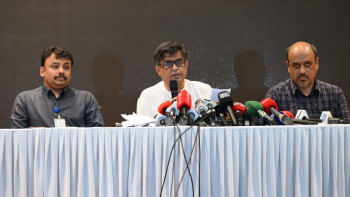CA’s Malaysia tour boosts Dhaka-KL ties
Chief Adviser Muhammad Yunus's visit to Malaysia has opened new areas of cooperation – both bilateral and regional -- especially in the efforts to address Myanmar conflicts and Rohingya crisis, as the two countries committed to building a future-oriented strategic partnership.
However, analysts say, labour welfare took a backseat to other priorities, despite the fact that over 1.2 million Bangladeshis work in Malaysia.
In the first state visit by a head of the government since 2014, the two countries signed five MoUs and three Exchange of Notes in the areas of defence, energy, education, investment, diplomatic training, business, research etc.
Malaysia has committed to working with Bangladesh and other ASEAN countries for peace in Myanmar and Rohingya repatriation. Malaysia will coordinate a delegation of ASEAN foreign ministers in the next few weeks for peace and humanitarian aid for the Rohingya and other communities in Myanmar.
This is a significant move provided that Bangladesh faces the burden of sheltering more than 1.2 million Rohingya, and that the foreign aid is declining fast. Moreover, nearly two lakh more Rohingya fled to Bangladesh since 2023 amid conflicts between the Myanmar military and rebel group Arakan Army.
Former ambassador M Shafiullah said Bangladesh wants to improve relations with the ASEAN bloc plus the regional countries by joining the regional grouping like Regional Comprehensive Economic Partnership, where Malaysia is an important player.
"Being an important country in ASEAN, it can play an important role in addressing Rohingya crisis. This is crucial for us," he told this correspondent, adding that Bangladesh and Malaysia share the burden of the Myanmar and Rohingya crisis.
On the trade front, he said, Bangladesh traditionally imports energy from the Middle Eastern countries. Malaysia, comparatively, is closer.
"It's great that we are diversifying our sources of energy imports," Shafiullah, a former senior research fellow at the Bangladesh Enterprise Institute.
Also, Malaysia is a market and producer of halal food and the semiconductor industry – which were discussed as priorities during Yunus's visit.
"We can enter new fields of cooperation with Malaysia if we can follow up properly," he said.
Rights activists say ensuring a fair recruitment system while holding accountable the perpetrators, who were engaged in labour exploitation in the past, should have been top of the agenda.
"We haven't seen any notable progress towards this end. Rather, we found Bangladesh's law enforcers cleared the syndicate of agents and other related officials of labour trafficking charges," said Shakirul Islam, chairperson of Ovibashi Karmi Unnayan Programme.
That was done following Malaysia's request to withdraw the cases for the sake of its reputation.
A syndicate of 101 recruiting agents selected by Malaysia sent 480,000 Bangladeshis there between 2022 and 2024.
Under a memorandum of understanding, the recruitment cost was fixed at Tk 78,000 but the actual cost was between Tk 450,000 and 600,000.
Earlier in 2017-2018, there was another syndicate of 10 agents who similarly charged hefty sums from the workers.
"The most important thing now should have been the regularisation of more than four lakh undocumented Bangladeshis, because they spent huge amounts of money and went there legally but became victims of syndication," Islam said.
They remain jobless, underpaid, unpaid and were not issued work permits -- not their fault but of the employers and agents, he added.
Many migrants also often face crackdowns in various parts of Malaysia and detention for reasons they are not responsible for, he added.
"We had expected the interim government to be tough against the syndicate and create an example," Islam said.
Refugee and Migratory Movements Research Unit Chair Tasneem Siddiqui said she thinks Dhaka has not forgotten the issue of fair recruitment, regularising the undocumented migrants and other welfare.
However, there are elements on both sides preventing the end of the syndication in recruitment, she added.
According to government officials, Bangladesh discussed the labour welfare issues and making the recruitment system fair and transparent; Yunus too discussed it with Malaysian Prime Minister Anwar Ibrahim.
"But the syndicate and their affiliates are very strong -- political elements are involved in it," said ambassador M Shafiullah.
Anwar Ibrahim is in a coalition government and he alone cannot take many decisions because of the pressure from the coalition members, said another labour migration expert.
Experts lauded Malaysian officials' confirmation that Bangladeshi workers will now be entitled to the same social security benefits as Malaysian workers and will be able to lodge complaints in Bangla.

 For all latest news, follow The Daily Star's Google News channel.
For all latest news, follow The Daily Star's Google News channel. 



Comments